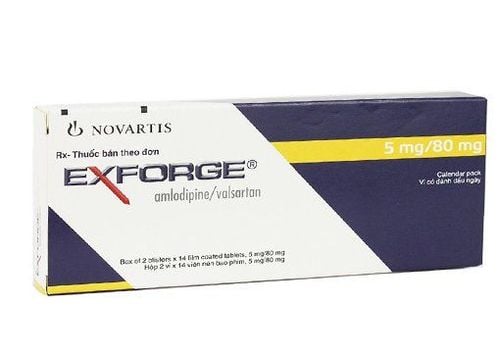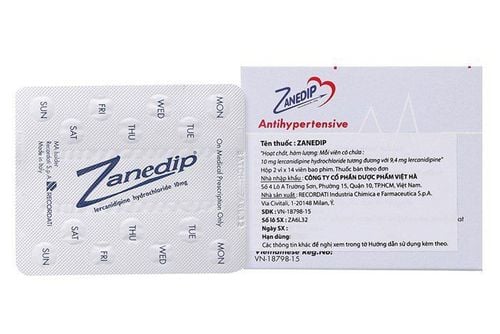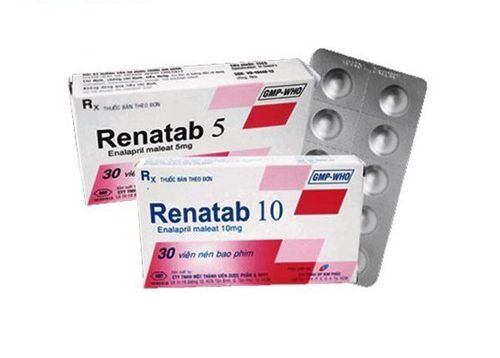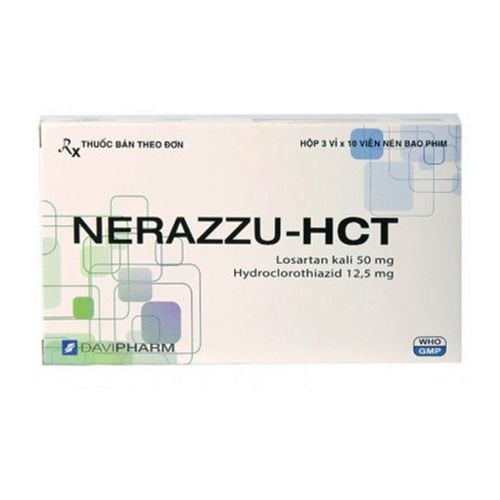This is an automatically translated article.
Kenzuda 10/12.5 is a combination drug consisting of 2 ingredients, Enalapril (a member of the antihypertensive drug group of angiotensin-converting enzyme inhibitors) and the rare Hydrochlorothiazide (belonging to the group of diuretics). The drug is effective in the definitive treatment of the symptoms of essential hypertension.
1. What is Kenzuda 10/12.5 drug?
What is Kenzuda medicine? Kenzuda 10/12.5 medicine is manufactured by Tipharco Pharmaceutical Joint Stock Company. This is a combination drug consisting of 2 ingredients, Enalapril maleate 10 mg and Hydrochlorothiazide 12 mg. The drug is prepared in the form of tablets, packed in boxes of 3 blisters x 10 tablets. Medicines are very effective in helping you to completely treat the symptoms of essential hypertension.
2. Indications and contraindications of the drug Kenzuda
Indications and contraindications of the drug Kenzuda are as follows:
2.1. Indications Kenzuda is prescribed and indicated in the following cases:
Kenzuda 10/12.5 is indicated for the treatment of all degrees of essential hypertension. Kenzuda 10/12.5 is indicated for the treatment of high blood pressure caused by kidney disease. Kenzuda 10/12.5 medicine is used to treat people with hypertension and diabetes. Helps improve life, slow down heart failure, reduce the number of heart attacks in people with heart failure in all levels. Kenzuda is indicated in the treatment and prevention of congestive heart failure. Kenzuda 10/12.5 medicine helps patients after myocardial infarction to prevent ventricular dilatation. 2.2. Contraindications Contraindications of Kenzuda in the following cases:
Patients with hypersensitivity to the ingredients of the drug Enalapril Patients with aortic stenosis and renal artery stenosis should not use the drug Contraindications of Kenzuda here is understood as an absolute contraindication, that is, the patient's drug is not flexibly used in any case.
3. How to use Kenzuda 10/12.5 dose.
3.1. Dosage For patients with primary hypertension, the drug dosage can be used as follows:
The starting dose will be 5 mg, depending on the degree of hypertension of the patient, the dose may be increased. drug quantity. After 2 to 4 weeks of treatment, the maintenance dose for the patient can be determined. The daily dose of the patient can be taken from 10-40 mg per day, the patient can take it once or divided into 2 times / day. The maximum dose that a patient can use in a day is 40 mg. To avoid symptoms of hypotension, patients should start the drug at a low dose and not use it with diuretics. For patients with renal failure, the dosage of Kenzuda drug is as follows:
Patients with creatinine clearance 30 - 80ml/min, a day can take from 5 to 10 mg of the drug. Patients with creatinine clearance 10-30ml/min, a day can take from 2.5-5mg of the drug. Patients with heart failure often use a combination of Digitalis and diuretics. Therefore, when using Kenzuda, the patient should reduce the dose of diuretics and use the interval before taking Enalapril.
The initial dose for the patient is 2.5 mg, after which the dose can be gradually increased up to the therapeutic dose, this process must be done under close, careful supervision. It should be noted: The above dose of Kenzuda is for reference only, patients need to take the drug exactly as prescribed by the doctor's prescription to improve the effectiveness of treatment, as well as avoid unwanted side effects.
3.2. How to use Because food does not change the drug's bioavailability, patients can use the drug before or after eating. You can take 1 to 2 doses per day based on the instructions of your pharmacist or doctor.
4. Notes and cautions when using Kenzuda
Be careful when using Kenzuda medicine in the following cases:
Elderly people, pregnant women, women who are breastfeeding, people under 15 years old, people suffering from liver failure, kidney failure, Patients who are allergic, hypersensitive to the ingredients of the drug should be careful before using Kenzuda. Kenzuda drug use Do not use the drug for pregnant women and those who are breastfeeding. Drivers and machine operators need to be careful when using Kenzuda to ensure job safety. If during use, the patient has any questions that need to be answered, please contact your doctor or pharmacist for the most accurate answer.
5. Side effects of the drug Kenzuda
During the use of Kenzuda medicine, patients may experience some of the following side effects:
Kenzuda medicine causes some side effects on blood and lymphatic system disorders, making the patient anemia. (aplastic anemia and hemolytic anemia), thrombocytopenia, granulocytopenia, neutrophils, hemoglobin and haematocrit decrease, causing bone marrow depression, causing a decrease in the whole body. In addition, can cause lymphoma and autoimmune disease. Users of Kenzuda drug may experience hypoglycemia due to nutritional disorders during use of the drug. Blurred vision symptoms may also be encountered when taking Kenzuda. Patients using Kenzuda may experience, specifically: dizziness, fainting, hypotension (including postural hypotension), tachycardia, myocardial infarction, cerebrovascular accident. In addition, patients in the process of using the drug also encountered chest pain, arrhythmia, palpitations, chest pain, Raynaud's syndrome. Some respiratory disorders such as cough, shortness of breath, pharyngitis, rhinitis, bronchospasm, asthma, pulmonary infiltrates, eosinophilic pneumonia, allergic alveolitis,... encountered during drug use. Side effects on the digestive system such as: nausea, diarrhea, altered taste, loss of appetite, indigestion, intestinal obstruction, constipation, pancreatitis, irritation causing stomach ulcers. Patients may experience dry mouth, mouth sores, glomerulonephritis. Having some disorders of hepatobiliary function such as: liver failure, hepatitis, cholestasis. Men who are male patients when using Kenzuda will experience side effects on the reproductive system such as impotence in sexual intercourse, menopausal syndrome. large breasts in men. During the use of Kenzuda, users may feel fatigue, weakness, cramps, ringing in the ears, dizziness, fever, flushing. laboratory tests such as: hyperkalemia, increased plasma creatinine, increased blood urea, increased blood sodium, elevated liver enzymes and increased plasma bilirubin A variety of symptoms have been reported by drug users including: fever, seritis, inflammation pulse, arthralgia, ANA positive, white blood cell and eosinophilia increased. The liver and kidney failure, proteinuria, oliguria. In addition to the possible side effects mentioned above, patients may also experience some symptoms of subcutaneous tissue and skin disorders such as: itchy rash, urticaria, hypersensitivity, hair loss, erythema multiforme, Stevens-Johnson syndrome, pemphigoid erythema, toxic epidermal detachment, exfoliative eczema. If during the course of taking the drug, the patient experiences any adverse side effects, they should immediately call the doctor for advice and support to ensure health safety.
6. Kenzuda drug interactions
Currently there is no information on the interaction of Kenzuda drugs, but to ensure effectiveness and avoid drug interactions, patients need to inform their doctors about the drugs, herbs, and functional foods being used. used for the doctor to consider and prescribe the appropriate medication.
7. Treatment when missed dose, overdose
Missed dose: Patients should not double the prescribed dose after forgetting a dose. When you forget to take a dose of medicine, if you remember the patient, take the medicine as soon as possible. However, if it is almost time for your next dose to remember, skip the missed dose and wait until the scheduled time to take your next dose. Overdose: In case of an emergency when the patient overdoses, immediately call the doctor, Emergency Center 115 or go to the nearest medical station for timely support. Storage: Store the drug in a place with a cool temperature, not exceeding 30 degrees C, a place with low humidity. Keep medicine in a closed cabinet away from children and pets. Once the expiration date has passed, the medicine can no longer be used. Besides, before use, the patient needs to observe the outside, if the medicine shows signs of watery, moldy damage, it should be discarded immediately. Consult environmental companies to know how to break down the drug
In short, Kenzuda is a combination drug consisting of 2 ingredients, Enalapril and Hydrochlorothiazide. The drug is effective in the definitive treatment of the symptoms of essential hypertension. To ensure effective treatment and avoid side effects, you need to carefully read the instructions contained in the medicine box, and consult with the doctor prescribing the medicine. Absolutely do not use more than prescribed or arbitrarily stop using without a doctor's prescription.
Follow Vinmec International General Hospital website to get more health, nutrition and beauty information to protect the health of yourself and your loved ones in your family.
Please dial HOTLINE for more information or register for an appointment HERE. Download MyVinmec app to make appointments faster and to manage your bookings easily.













